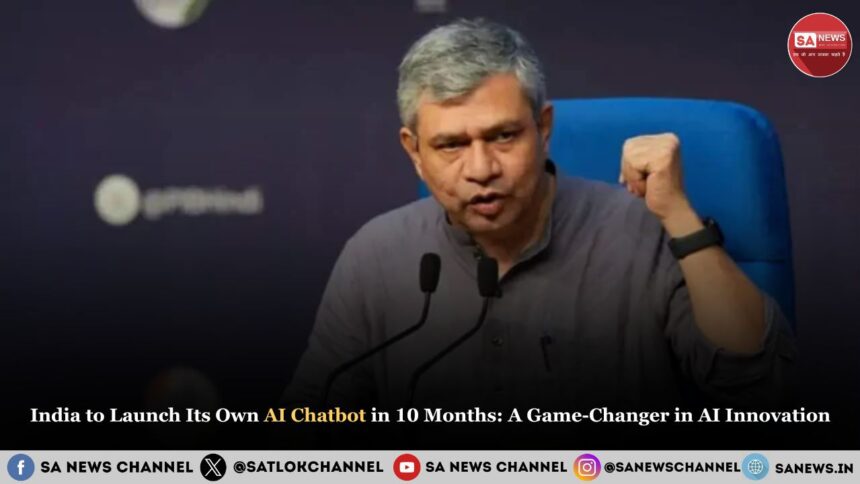In a significant move to bolster its position in the global artificial intelligence (AI) landscape, India has announced plans to develop its own world-class AI chatbot within the next 10 months. This initiative aims to create a nation-specific AI assistant that is free from biases and tailored to the diverse linguistic and cultural nuances of the country.
The government’s commitment to this endeavor is evident through the selection of 18 application-level AI solutions, each poised to receive dedicated funding. This strategic investment underscores India’s determination to foster innovation and establish a robust AI ecosystem that addresses the unique needs of its populace.
A cornerstone of this mission is the substantial financial backing approved by the Cabinet. Over the next five years, more than ₹10,300 crore has been allocated to the IndiaAI Mission. This funding is set to empower AI startups and expand access to computing infrastructure across the nation. Key components of this mission include the development of the IndiaAI Compute Capacity, the establishment of the IndiaAI Innovation Centre (IAIC), the creation of the IndiaAI Datasets Platform, and the launch of the IndiaAI Application Development Initiative. Collectively, these efforts aim to position India as a global leader in AI innovation.
The IndiaAI Compute Capacity is particularly noteworthy, as it envisions the creation of a cutting-edge, scalable AI computing infrastructure. This will be achieved by deploying over 10,000 Graphics Processing Units (GPUs) through strategic public-private collaborations, ensuring that the nation’s AI endeavors are supported by robust computational resources.
Union Minister of State for Electronics and IT, Skill Development and Entrepreneurship, and Jal Shakti, Shri Rajeev Chandrasekhar, emphasized the transformative potential of AI for India’s digital economy. He stated, “AI is going to be the kinetic enabler for India’s digital economy. Prime Minister Modi ji has always said that India is going to fully exploit the power of AI for the benefit of its citizens and for the expansion of its economy.”
In addition to government-led initiatives, the private sector is also making significant strides in AI development. Notably, Bhavish Aggarwal, founder and chairman of Ola, has introduced ‘Krutrim AI,’ an AI chatbot designed to rival existing platforms like OpenAI’s ChatGPT and Google’s Gemini. Currently available in public beta, Krutrim AI supports more than 10 Indian languages, including English, Hindi, Tamil, Bengali, Marathi, Kannada, Gujarati, and even Hinglish—a blend of Hindi and English. Aggarwal highlighted the chatbot’s deep integration with Indian values and data, aiming to provide culturally relevant assistance to users.
■ Also Read: Chinese AI Model DeepSeek Explained: Innovation Or Overhyped?
Another notable development is the launch of ‘Ask QX’ by QX Lab AI. This AI tool is capable of understanding and communicating in over 100 languages, including 12 Indian languages such as Hindi, Bengali, Telugu, and Marathi. Available for Android users and on the web, with an iOS version forthcoming, Ask QX offers both free and paid versions, catering to a broad spectrum of users. The platform’s versatility and multilingual support underscore its potential to democratize AI access across India’s diverse population.
These concerted efforts by both the government and private sector reflect India’s resolve to harness AI’s transformative power. By developing nation-specific solutions that are free from bias and tailored to local needs, India is not only advancing its technological capabilities but also ensuring that the benefits of AI are accessible to all its citizens.
AI Innovation and the Vision of a Vishwa Guru India
India’s rapid strides in artificial intelligence reflect its commitment to becoming a self-reliant technological powerhouse. By developing a nation-specific AI chatbot and investing in indigenous AI solutions, the country is positioning itself as a global leader in innovation. However, true leadership extends beyond technology—it requires a foundation of ethical values, universal justice, and spiritual wisdom.
Sant Rampal Ji Maharaj teaches that a nation attains true greatness when it upholds righteousness, equality, and spiritual knowledge alongside material progress. According to His teachings, India was once the land of supreme wisdom, known as Vishwa Guru (World Teacher), because it preserved the eternal truth of God’s Constitution. Today, as India advances in AI and digital transformation, integrating spirituality with technological progress can ensure that these innovations serve humanity with fairness and righteousness.
A bias-free AI, developed with ethical principles, aligns with the vision of a society where knowledge is used for the welfare of all, not just for economic gains. As Sant Rampal Ji Maharaj emphasizes, true progress is achieved when science and spirituality go hand in hand, guiding humanity toward a just and enlightened world. If India embraces this holistic approach—leveraging technology while following God’s true knowledge—then reclaiming the title of Vishwa Guru will not just be a vision but an inevitable reality.









